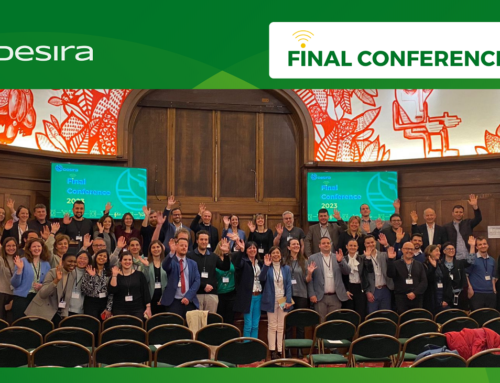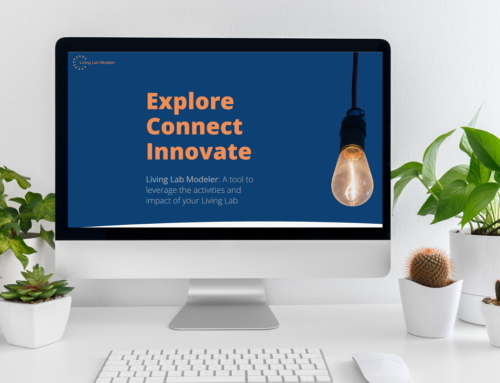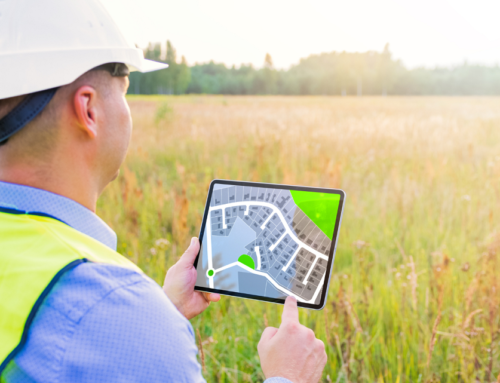In DESIRA – Digitisation: Economic and Social Impacts in Rural Areas, we are 25 partners from 16 Members States coming together to implement this 4-year project. Our main objective is to improve the capacity of society and political bodies to respond to the challenges of digitalisation in rural areas, agriculture and forestry by building a knowledge and methodological base that makes it easier to assess the past, current and future socio-economic impacts of ICT-related innovation.
The importance of digitalisation has been central the Sustainable Development Goals (SDGs) (Goal 9). Scholars as well as leading international institutions are stressing the fact that radical technological innovation, and more specifically digitalisation processes, will be key for the SDGs to have a real impact over the next decade.
Our starting point is that rural areas are in the midst of a 4th industrial revolution, characterised by the integration of new technological developments such as the Internet of Things (IoT) and Artificial Intelligence (AI), that build on digital processes developed during the third industrial revolution.
New digital technologies are considered ‘game changers’, as they deeply reconfigure routines, rules, actors and artefacts that constitute business models, consumption, shopping styles, service provision, as well as learning processes and innovation. Digitalisation has deep repercussions for people’s lives, generating winners (who benefit from the changes), losers (who are marginalised by the changes), and opponents (who resist and elaborate alternative rules of the game).
An important added value of our research pathway is that we aim to strengthen and promote the Responsible Research and Innovation (RRI) approach and its methods by filling the knowledge gaps on digitalisation in agriculture, forestry and rural areas. In this respect, the activities of DESIRA will apply the following principles of RRI namely Inclusiveness; Openness and Transparency; Reflexiveness and Anticipation; Responsiveness; Diversity and Inclusion.
This consortium will carry out activities to develop knowledge that helps rural communities, actors and policy-makers take advantage of digitalisation processes. There is no one better than the people involved in DESIRA activities to describe the expected contribution, our expectations and ambitions with this project.
Conceptualisation of digitalisation and mapping 300 Digital Game Changers
We will develop an interdisciplinary and transdisciplinary Conceptual and Analytical Framework to provide definitions of the key concepts related to digitalisation, research hypotheses and research questions of the project. Also, we will develop a Taxonomy and Inventory of Digital Game Changers which will result in a database on 300 examples of applications of digital technologies together with an analysis of their socio-economic impact, to create a knowledge base on ICT tools applied to agriculture.
“Merging conceptual frameworks with real life practices is not easy. It’s our ambition to operationalise the conceptual framework into a useful frame for the Living Labs, and to derive an ethical code from it.”
An open-access socio-economic assessment tool of the impacts of digitalisation in rural area
Digitalisation can have both positive and negative impacts, depending on conditions of access to ICTs, the design of the technologies, the complexity of the systems wherein they are embodied. We will assess the impacts of digitalisation against criteria aligned with Sustainable Development Goals. This work will contribute to developing an inclusive approach to data collection and assessment of digitalisation impacts as well as to select and validate a set of socio-economic sustainability indicators and a digitisation index for a comprehensive monitoring system at different levels. Last, we will measure costs, benefits, trade-offs and gaps between users’ and societal needs and expectations. All this work will also result in the publication of an open-access Socio-Economic Assessment tool.
“Our principal expectation is to contribute to improving knowledge about impacts of digitalisation in agriculture, forestry and rural areas, in order to take the opportunities and minimize the undesired effects.”
Future digitalisation scenarios, Use Cases and Showcase Technologies
The future outcomes of digitalisation will depend on the capacity of communities, researchers and innovators to anticipate its impacts – either intended or unintended, negative or positive – as well as to identify appropriate impact pathways for development. We will co-develop plausible future scenarios of the impacts of digitalisation in agriculture, forestry and rural areas in 20 regional Living Labs and one for the EU as a whole. These scenarios will enable us to identify desirable solutions to problems and elaborate ‘Use Cases’ that apply ICT-based solutions to those problems. In addition, we will develop two showcase technologies that apply RRI.
“We will establish and develop living labs and use scenario planning to successfully identify future strategic pathways and their potential outcomes as well as using digital storytelling techniques.”
A Virtual Research Environment for engagement
We aim to boost interactive innovation within a multi-actor network alongside outer circles of stakeholders. Thanks to digitalisation, online interaction is usefully changing the way people communicate, learn and share knowledge. Drawing on past experience of online communities of practice and AKIS organisation, we will dedicate a relevant part of the project to online interaction and to the necessary infrastructure, particularly in the development of the Virtual Research Environment that allows advanced interaction within the DESIRA consortium and with outer circles of stakeholders.
“A major contribution of our work will be to assess both the digital gap and provide digital solutions to reduce it, taking into account RRI principles by design.”
A European Rural Digitisation Forum
We will implement targeted actions to raise awareness of policy makers, innovators, SMEs, farmers, and researchers and other relevant stakeholders on the socio-technical impact of digitalisation in agriculture, rural areas and forestry. We adopt an integrated approach to exploitation, dissemination, communication and outreach strategy, embodying all these different activities in research activities in compliance with the RRI approach. In this respect, we will create and coordinate a high impact and sustainable DESIRA community supported by the European Rural Digitisation Forum, which is open to all rural stakeholder from across the EU. This forum will provide a diverse space for interaction between key stakeholders interested in the digitalisation of rural areas, such as face-to-face meetings, online platforms and a periodic forum.
“We will try to maximise all the excellence and knowledge produced in the project and create an active European community of stakeholders, enthused to share and bring forward digital solutions that benefit rural areas.”
Join us in our innovation pathway
DESIRA will deliver innovative knowledge and practical tools that will enable rural areas and communities to better prepare to face the challenges of digitalisation while taking advantage of new opportunities that emerge. If you are interested in the outcomes of our project, you have plenty of opportunities to join us in our research pathway and contribute your experience to this process. Keep yourself informed by subscribing in our newsletter and following our social media channels on Twitter and Facebook
__________
Image by Matthias Zeitler from Pixabay











